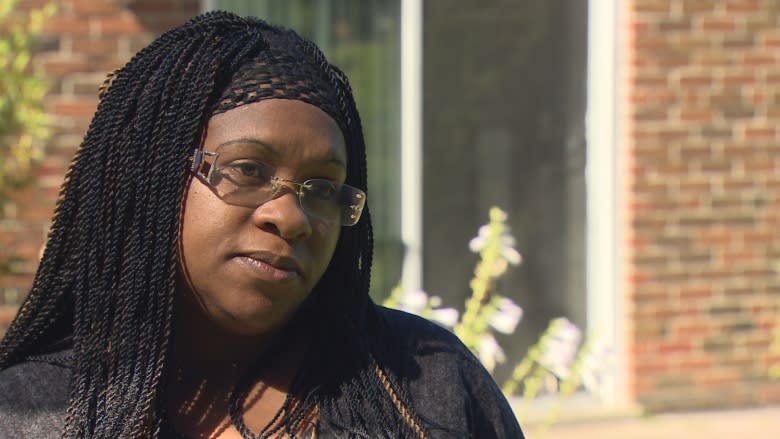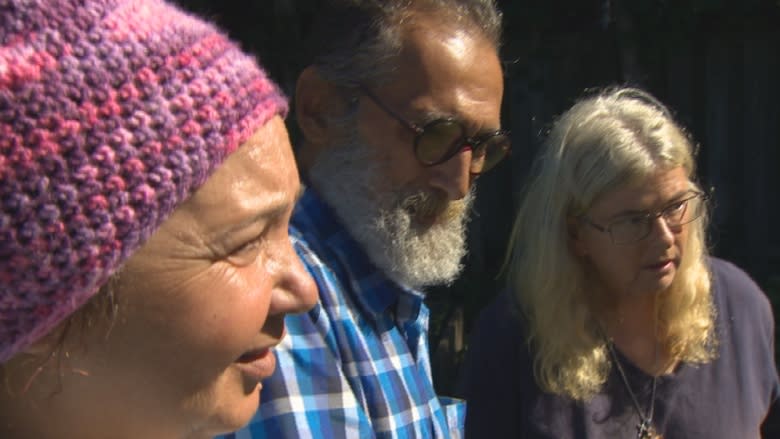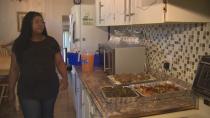Citing lack of oversight, Toronto wants to shut down unlicensed group homes in Scarborough
Two years ago, Dalal Mouhra Salhani got sick.
She couldn't pay rent on her apartment or manage on her own, so her daughter found her a spot in a group home, a bungalow on a quiet, shady street in Scarborough.
"It's nice here. I have my own bed, my own room. I like the neighbours," said Salhani, her voice shaking.
It's people like Salhani who are losing out in a regulatory tug-of-war between unlicensed group home owners in Scarborough and the city of Toronto.
At issue is whether they should be allowed to operate without provincial oversight.
'They're going to be in the street'
Salhani lives in an unlicensed group home — meaning the province has not funded or approved it — near the intersection of Ellesmere and Neilson roads.
It's one of four houses owned and operated in Scarborough by Simone Sewell, who says she has about 40 people in her care.
"I have seniors, young adults, people that are mentally challenged. Schizophrenic, bipolar, dementia," Sewell said.
Residents pay Sewell using their pensions or disability cheques, and she provides them with room and board and hires support workers to help them.
Citing a bylaw that requires that all group homes have either provincial licensing or funding, the city has declared the house, in which Salhani lives, to be an illegal rooming house.
Although Scarborough has been part of Toronto for nearly 20 years, the district still follows a pre-amalgamation rule that forbids rooming houses of any kind.
"She's been charged with zoning contraventions," Mark Sraga, the city's director of investigation services, said. "[She's been] operating contrary to the city's zoning by-law."
Sewell said that before 2015, she had never been asked for provincial licensing or funding, and that in the past, she was told to simply write "funding pending" on her yearly zoning application form with the city.
According to her, the problem only came up when she set up her newest group home last year and put in her regular zoning application.
Since then, she said she's been searching for a licence from the province, but said that the hunt has put her down a bureaucratic rabbit hole and that she's been unable to make any progress.
Sraga said many group home operators are able to provide the city with proof of provincial oversight without issues.
"[They] come to us, provide us with the documentation, and they furnish it to us with no issues, no questions," he said.
Licence or not, Sewell says she's concerned that if she is forced to shut down, the residents living with her will be homeless.
"These clients that I have, they can't be in a shelter. They need to get their medication and be monitored. They have to be in a supervised environment, and they wouldn't be able to last in a shelter. They're going to be in the street," she said.
City has 'insufficient housing with supports'
Winston Manning, who also owns four group homes, rolled up to be interviewed in a moving truck.
He said he's moved his residents five times in the last year to avoid being charged with running an illegal rooming house.
Like Sewell, Manning said his residents are better off with him, and that if he is forced to shut down, they won't have anywhere to go.
"Shelters don't want them, hospitals pushing them out, nursing homes don't want them," Manning said, "Some of the people don't fit the criteria for those places so they will be left on their own."
Dr. Kwame McKenzie, medical director of underserved populations at Centre for Addiction and Mental Health (CAMH), agrees with Manning at least in part, explaining that houses like his are filling a gap in the system.
"Part of the reason they exist is that right now we have insufficient housing with supports for people with mental health problems and we have insufficient long-term care for the elderly," he said.
McKenzie said there's no way of knowing how many houses there are like this in the city.
"I don't think it's necessarily a terrible thing. The question is, what is the quality, and what is the oversight?," he said.
'People in there aren't protected'
Opposition to unlicensed group homes at the municipal level is fierce.
Glenn De Baeremaeker, city councillor for Ward 38, Scarborough Centre, said it's a perennial problem in his area, one he has dealt with for his full 13 years in office.
"[You get] people who say, 'Hey, I've got a house, and I'm going to stuff it full of old people and I'm going to call it a group home.' But it's not a group home, it's not regulated by the government, and the people in there aren't protected," he said.
Coun. Michael Thompson, who represents Ward 37, Scarborough Centre, echoes De Baeremaeker's concerns.
"We don't have a way to monitor them," he said, adding that his office receives numerous complaints from residents about illegal rooming houses on their streets, including some that self-identify as group homes.
What next?
The question remains: What will happen to the residents living at houses such as those run by Sewell and Manning if they are shut down?
McKenzie at CAMH cautions that municipal governments should be mindful of the consequences of shutting down an unlicensed group home before they take action.
"I would be quite concerned about the possibility of taking knee-jerk action and making people homeless without thinking about where they are going to live and what you are going to put in its place," he said.
As for Sewell, she's been on a yearlong campaign to draw attention to her situation.
She hopes that city council will amend the group home bylaw in Scarborough to allow her to keep her doors open, making her case in a letter that she sent to politicians and the media.
"The mere fact that these homes were operating for years without provincial funding or licences shows that we are capable of taking diligent care of these individuals," she wrote.
Sewell says city council should look to Mississauga as an example.
"Mississauga does operate [group homes] with or without provincial funding and licences. So they could amend the bylaw to allow us to operate," she said.
The city of Toronto is conducting a review of its regulations around rooming houses — including a look at vulnerable tenants. The report will be released this fall.












